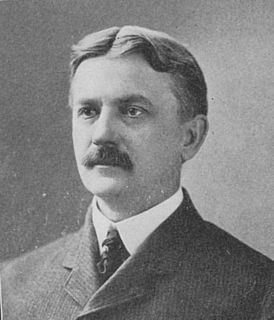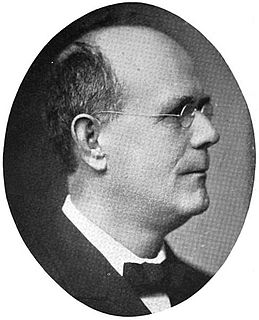Herbert George Welch was an American Bishop of the Methodist Episcopal Church, The Methodist Church and the United Methodist Church. He was elected to the Episcopacy in 1916. He also distinguished himself as a Methodist Pastor, and as the fifth President of Ohio Wesleyan University, Delaware, Ohio.

Matthew Simpson was an American bishop of the Methodist Episcopal Church, elected in 1852 and based mostly in Chicago [Correction: Philadelphia. Simpson and his wife were fixtures of Society Hill]. During the Reconstruction Era after the Civil War, most evangelical denominations in the North, especially the Methodists, were initially strong supporters of radical policies that favored the Freedmen and distrusted the Southern whites. However by the late 1860s in border state conferences, the MEC North moved well away from their work with the Freedmen's Bureau and often sided with the grievances of Southern white members. Bishop Simpson played a leading role in mobilizing the Northern Methodists for the cause. His biographer calls him the "High Priest of the Radical Republicans."

John William Hamilton was an American bishop of the Methodist Episcopal Church, elected in 1900. He was the chancellor of American University from 1916 until 1922. He was the older brother of Franklin Elmer Ellsworth Hamilton, who was also both a Methodist Bishop and the Chancellor of American University.

Franklin Elmer Ellsworth Hamilton was an American bishop of the Methodist Episcopal Church, elected in 1916.
Thomas Asbury Morris was an American Bishop of the Methodist Episcopal Church, elected in 1836. He also distinguished himself as a Methodist Circuit rider, Pastor, and Presiding Elder, and as an Editor.

James Edward Dickey was an American Bishop of the Methodist Episcopal Church, South, elected in 1922.
George Richmond Grose (1869–1953) was an American academic administrator and a bishop of the Methodist Episcopal Church, elected in 1924, serving as a missionary bishop in China.

David Hastings Moore was an American bishop of the Methodist Episcopal Church, elected in 1900. He also gained notability as a Union Army officer in the American Civil War, as a pastor, as the editor of an important Methodist periodical, and as a university chancellor.

Elijah Embree Hoss, Sr was an American bishop of the Methodist Episcopal Church, South, elected in 1902. He also distinguished himself as a Methodist pastor, as a college professor and administrator, and as an editor.

Earl Cranston was an American Bishop of the Methodist Episcopal Church, elected in 1896. He also distinguished himself as a Methodist Pastor and Presiding Elder, and as an editor and publisher of the M.E. Church.
Emerson Stephen Colaw was a retired American Bishop in the United Methodist Church and theologian specializing in homiletics. Colaw was first elected as bishop in 1980.

John Philip Newman was an American Bishop of the Methodist Episcopal Church, elected in 1888.
John Monroe Moore was a Bishop of the Methodist Episcopal Church, South, elected in 1918.

Charles Bayard Mitchell (1857–1942) was an American Bishop of the Methodist Episcopal Church, elected in 1916. He also distinguished himself as a pastor and in service to his denomination.
Wesley Matthias Stanford was an American bishop of the United Evangelical Church, elected in 1891.

The Allen Temple AME Church in Cincinnati, Ohio, USA, is the mother church of the Third Episcopal District of the African Methodist Episcopal Church. Founded in 1824, it is the oldest operating black church in Cincinnati and the largest church of the Third Episcopal District of the AME Church.
Titus Lowe was an English-American Bishop of the Methodist Episcopal Church and The Methodist Church, elected in 1924.
William Walter Peele was an American bishop of the Methodist Episcopal Church, South, and The Methodist Church, elected to said office in 1938. He also gained notability as a college professor, a pastor, and as the president of the Council of Bishops of his denomination. Bishop Peele was one of the last eight bishops elected by the M.E. Church, South.

Charles Spencer Smith (1852–1923) was a Methodist minister and afterwards bishop of the African Methodist Episcopal Church. Born and raised in Canada, Smith moved to the United States at age fourteen and after a series of jobs and two years in the Alabama Legislature, he became an ordained minister, pastoring in several southern states before being assigned to the Chicago Conference of the AME Church. Exposed to the work of the Sunday School Union there, he proposed that a similar organization be established for the AME Church. He founded the organization and the first publishing house in the country owned by a person of African descent using steam presses. After his appointment as Bishop, Smith traveled widely and was assigned conferences in Canada, the Caribbean, Africa, and several in the United States. Upon retiring from conference work, he became the historian of the AME Church and wrote at least two books.
Aubrey Franklin Hess was a progressive American theologian and educator. Born on a mountaintop farm in Virginia, Hess without formal theological training was ordained in the Methodist Protestant church in 1896 and immediately served two small congregations in West Virginia. Later, after completing his formal theological and university education, Hess served as president of the Methodist Protestant institutions of West Lafayette College, Ohio and Adrian College, Michigan.










